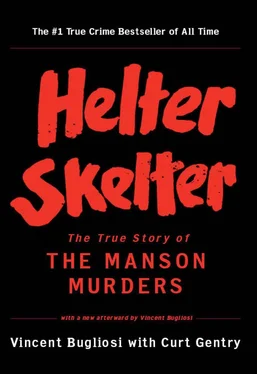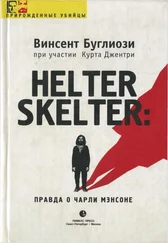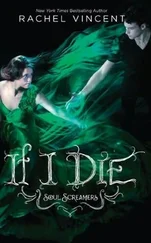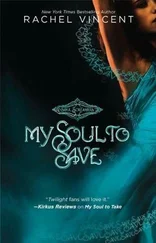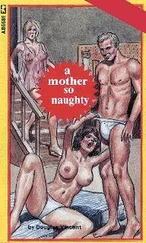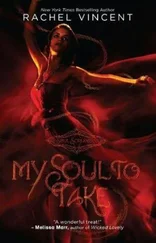Taking the stand on direct examination by the defense, Tex played the part of Manson’s abject slave. He admitted shooting or stabbing six of the Tate-LaBianca victims, but denied stabbing Sharon Tate. And everything which showed either premeditation or deliberation he put on Manson or the girls.
My cross-examination so shook Tex that he often forgot he was supposed to be playing the idiot. By the time I’d finished, it was obvious to the jury that he was in complete command of his mental faculties and probably always had been. I also got him to admit that he had stabbed Sharon Tate too; that he didn’t think of the victims as people but as “just blobs”; that he had told Dr. Joel Fort that the people at the Tate residence “were running around like chickens with their heads cut off,” and that when he said this he had smiled; and I tore to shreds his story that he was simply an unthinking zombie programmed by Charles Manson, as well as cast considerable doubt on his claim that he now felt remorse for what he had done.
Watson’s testimony cleared up some mysteries:
Contrary to the findings of LAPD evidence-expert DeWayne Wolfer, Watson identified the pair of red wire cutters found in Manson’s dune buggy as the pair he had used to cut the Tate telephone wires that night.
Also revealed for the first time were Manson’s exact instructions to Watson on the night of the murders at 10050 Cielo Drive. Watson testified: “Charlie called me over behind a car…and handed me a gun and a knife. He said for me to take the gun and knife and go up to where Terry Melcher used to live. He said to kill everybody in the house as gruesome as I could. I believe he said something about movie stars living there.”
And Watson admitted that when he entered the LaBianca residence, he was already armed with a knife.
My greatest difficulty during the entire Watson trial came not from the evidence, the defense attorneys, or the defense witnesses, but from the judge, Adolph Alexander, who was a personal friend of defense attorney Sam Bubrick.
Alexander not only repeatedly favored the defense in his rulings, he went far beyond that. During voir dire he remarked: “Many of us are opposed to the death penalty.” When prosecution witnesses were testifying, he gave them incredulous, unbelieving looks; when defense witnesses took the stand, he industriously took notes. All this was done right in front of the jury. He also frequently cross-examined the prosecution witnesses. Finally, I’d had it. Asking to approach the bench, I reminded Alexander that this was a jury trial, not a court trial, and that I was immensely concerned that by cross-examining the prosecution witnesses he was giving the jury the impression that he didn’t believe the witnesses, and since a judge has substantial stature in the eyes of a jury, this could be extremely harmful to the People. I suggested that if he wanted to have certain questions asked, he write them out and give them to the defense attorneys to ask.
Thereafter Alexander cut down on his cross-examination of the prosecution witnesses. However, he still continued to amaze me. When the jury went out to deliberate, he didn’t even have the exhibits sent back to the jury room—a virtually automatic act—until after I had demanded that he do so. And once, in chambers and off the record, he referred to the defendant as “poor Tex.”
Also off the record was a remark I made to him toward the end of the trial: “You’re the biggest single obstacle to my obtaining a conviction of first degree murder in this case.”
Despite the problems presented by Judge Alexander, on October 12, 1971, the jury found Watson guilty of seven counts of first degree murder and one count of conspiracy to commit murder. That I had effectively destroyed the testimony of the defense psychiatrists on cross-examination was borne out by the fact that on October 19 it took the jury only two and a half hours to decide that Watson was sane. And on October 21, after remaining out only six hours, they returned with a verdict of death.
The trial had lasted two and a half months and cost a quarter of a million dollars. It also added another forty volumes, 5,916 pages, to the mini-library on the Tate-LaBianca murders.
Although Judge Alexander thanked the jury for the conscientious job they had done, he remarked, on the day he sentenced Watson, “If I had tried this case without a jury, I possibly would have arrived at a different verdict.”
In still other proceedings, Susan Atkins pleaded guilty to the murder of Gary Hinman and was given life imprisonment. In sentencing her, Judge Raymond Choate called her “a danger to any community,” who should spend “her entire life in custody.”
The defense obtained separate trials for Charles Manson, Bruce Davis, and Steve Grogan on the combined Hinman-Shea murder charges. Despite the fact that the body of Donald “Shorty” Shea hadn’t been found (and hasn’t to this day), prosecutors Burt Katz, Anthony Manzella, and Steven Kay succeeded in the difficult task of obtaining guilty verdicts against each of the defendants on all of the counts. Verdicts of life imprisonment were returned for Manson and Davis. The Grogan jury voted death, but when it came time for sentencing—two days before Christmas 1971—Judge James Kolts, commenting that “Grogan was too stupid and too hopped up on drugs to decide anything on his own,” and declaring that it was really Manson “who decided who lived or died,” reduced the sentence to life imprisonment.
During voir dire in his trial, Manson, angered by the judge’s refusal to let him represent himself, told the Court: “I enter a plea of guilty. I chopped off Shorty’s head.” The judge refused to accept the plea, and the next day Manson withdrew it. During another angry outburst, Manson turned to the press and said, “I’ve told my people to start killing you.”
Again Manson was represented by Irving Kanarek. With Irving, he knew it would be a long trial, postponing his trip to San Quentin’s Death Row.
Through all the trials, the Manson girls continued their vigil on the corner of Temple and Broadway. Literally in the shadow of the Hall of Justice, in view of the thousands of people who passed that corner every day, they fashioned a bizarre plot to free all the imprisoned Manson Family members.
In late July of 1971 my co-author learned from a Family member in the San Francisco Bay Area that the Family was planning to break out Manson sometime within the next month. Though he was not told how they intended to accomplish this, he was given some additional details: the Family was stockpiling arms and ammunition; they had secretly rented a house in South Los Angeles and were hiding an escaped convict there; and with Manson’s escape “Helter Skelter will really start; the revolution will be on.”
Wishful thinking? I wasn’t sure, and passed the information along to LAPD. When I did, I learned that among the witnesses Manson had called in the Hinman-Shea trial was a Folsom convict named Kenneth Como, also known by the colorful aka Jesse James. Though it hadn’t been publicized, when brought to Los Angeles less than a week before, Como had managed to escape from the Hall of Records. LAPD doubted, however, that he was still in the area. As for the Manson escape, they had heard rumors also, but nothing definite. They were inclined to doubt the tale.
On schedule, less than a month later, the Manson Family made their attempt.
Shortly after closing time on the night of Saturday, August 21, 1971, six armed robbers entered the Western Surplus Store in the Los Angeles suburb of Hawthorne. While one kept a shotgun on the female clerk and two customers, the others began carrying rifles, shotguns, and pistols to a van parked in the alley outside. They had collected about 140 guns when they spotted the first police car. LAPD, alerted by a silent alarm, had already sealed off the alley.
Читать дальше
